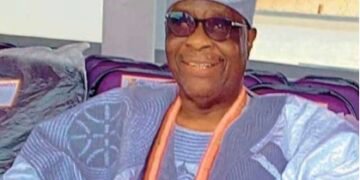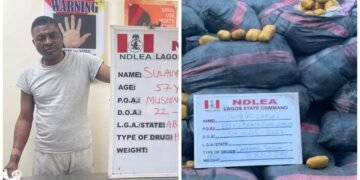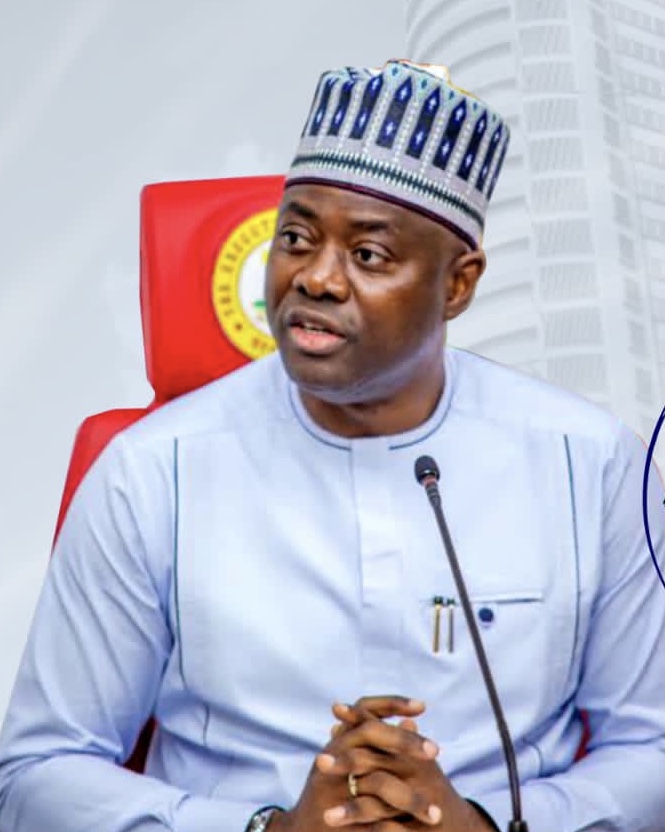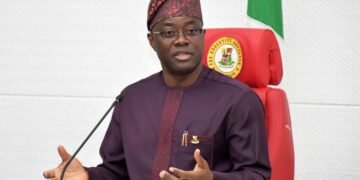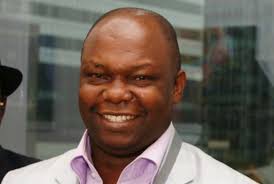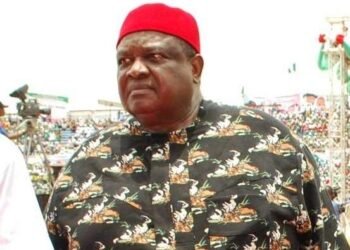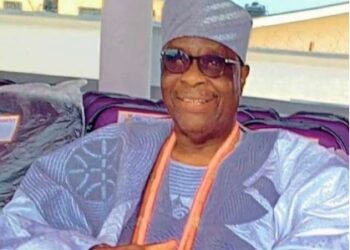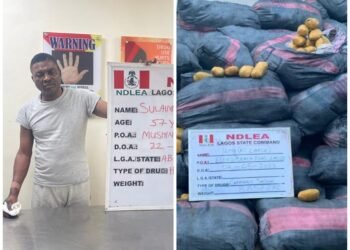Festus Adedayo
There was this conversation between President Muhammadu Buhari and Al Jazeera television held in Quatar in March, 2016. That interview explains the imperialness, the Kabiyesi-ness in Buhari and his feudal reasoning which often clashes with the constitutional requirements of his office as president of Nigeria. It also rubbishes Nigerians’ hoopla against the president’s oft recourse to medical exile in the United Kingdom at the drop of a hat.
The conversation came at the height of a foreign exchange crisis that the Buhari government sank Nigeria into. Sitting regally like the Emir of Daura on a gold-plated chair, in the front of Martine Dennis, his Al Jazeera interviewer, she had asked him how parents whose wards were schooling abroad would cope with the then scarcity of forex and its huge worth. Boldly, Martine had asked: “What about those who are slightly more privileged like yourself… You’ve got children studying abroad. There are parents in Nigeria with kids in universities and schools abroad, who are now facing the possibility of having to pull their kids out. They can actually no longer afford to pay for school fees?” And Buhari replied: “If the country cannot afford it, so be it.” Fazed by the scant human feeling in the reply and unsatisfied with the curt reply, Martine further pursued, cheekily: “But your children will continue their studies, no doubt?” Buhari then replied: “Those who can afford it can still afford it. But for those who can’t, Nigeria cannot afford to allocate foreign exchange for those who decided to train their children outside the country. We can’t just afford it.” Cheekily again, Martine blurted, “So it’s tough luck?” And the General’s last word, indicative of finality on that unconscionable questioning was, “Well, that’s the true situation we are in.” As if Martine was a seer, many Nigerian parents actually withdrew their wards from those foreign schools.
Apart from the feudal nature of the Daura where he grew up, Buhari was, for decades, a military man, nurtured on the maxim that might is right. Democracy and constitutionalism were alien constructs in the barracks. The military officer was always right and woe betides any subaltern who queried his judgment. So why these disgruntled noises all over the place? Like Buhari, in The President Is A Sick Man: Buhari’s Secret Therapy Inside the ‘Oneida’ (April 4, 2021) I detailed African leaders who have made the west their infirmary.
Last week, when that unsettling photograph of Buhari and All Progressives Congress (APC) National Leader, Asiwaju Bola Tinubu, issued from their UK convalescent home, majestically colonized the social media space, like ants gradually constructing an anthill, Al Jazeera’s Martine Dennis constructed a profiling of Buhari in my mind. In different postures, Buhari and Tinubu, two very consequential Nigerian leaders who, like any other mortal, are rumoured to be battling life’s unkind health cudgel, smiled resplendently in the photograph. This was apparently to cushion whatever pain emanating from whatever ails them. And simultaneously, three persons crept into my subconscious – New York’s departing governor, Andrew Cuomo; Helen Zille and ex-President Jacob Zuma of South Africa.
Why would Buhari and Tinubu choose to hibernate in a UK infirmary to look up their health at a time when Nigeria’s health, literally and figuratively, is gasping for breath? Why flaunt such sickening pictures of them seeking bailout from their own sicknesses, in the face of a sick Nigeria?
In its literal representation, Nigeria’s health sector is manifesting some sickening features. This is a time cholera is ravaging Nigerians, having unofficially killed about 700 people. The Delta variant of dreaded COVID-19 pandemic also seems to be ramping up enough energy to ferry more Nigerians to the morgue. Yet, about 19,000 medical doctors in Africa’s most populous nation are on strike, the fourth since the outbreak of the pandemic.
Ravaged by non-payment of salaries and allowances which in some cases have mounted up to 16 months, anyone with a sick patient at this time will understand the purport of the prayer, “may Nigeria never happen to you.” Martine Dennis’ words came ringing in my mind. It is tough luck for Nigerians who died due to the parlous state of Nigeria’s medicare and tougher luck for those who cannot Andrew like Buhair and Tinubu to treat their ailments abroad.
At its metaphoric best, Nigeria is sick at all levels, the most bothersome being the ailment that has afflicted its leadership. Nigerian leaders exhibit acute sickness of mind. Some are so sick that the disease of mind reflects in their acquisitory thirst, while others’ sickness is manifest in that they are incapable of stemming the drift in Nigeria. Yet, some others’ is that they cannot replicate in Nigeria the order and finesse they daily see in their junkets abroad. That Buhari, who campaigned to be president on the promise of reforms of the collapse that has ripped through Nigeria’s public health architecture, was in London to straighten the rough edges of his own health, while Nigeria’s health sector is going through worse stasis than when he became president, six years ago, is the greatest indicator of a Nigeria that is sick. Nothing could be as sickening as the fact that, though Nigeria is footing the huge foreign exchange bill of his convalescence, Nigerians don’t know what ails President Buhari.
In a piece penned by Helen Zille, most of these issues were analyzed. Born Otta Helene Maree, Zille is a South African politician who served as Mayor of Cape Town from 2006 to 2009, among other positions. Written immediately South African ex-president, Jacob Zuma, was jailed for fifteen months for contempt by SA’s Constitutional Court, a piece which subsequently went viral, using the aid of personal acquaintance and in-depth examination, Zille analyzed how Zuma transitioned from a traditionalist to constitutionalist. As a traditionalist, she said, his province of operation was borderless but in the South African presidency he occupied, Zuma was circumscribed round constitutionalism and alien tenets of democracy, whose his understanding of their concepts was at best meager and theoretical. Zille called the route Zuma had to travel a total “misalignment” and “unfamiliar” to him.
It was a forensic examination of Zuma. Zille beautifully explains the complexity of the dual circumstances of many African leaders. The piece explains why Buhari talked on top – apologies to General Ibrahim Babangida – Nigerian parents in 2016 because of the majesty of his privileged position as Kabiyesi of Nigeria; it also explains his and Tinubu’s junkets to London for medical vacation, as well as Isa Pantami, minister of communications and digital economy’s continued presence in office, as against the ease of New York Governor, Andrew Cuomo’s resignation. This is where the reality of Zille’s tragic observation of the enormous complexity existing in the clash between leadership in traditional and modern society comes to the fore.
Now, you must have heard the very un-African story of Cuomo. Buffeted on all flanks by charges of serial harassments of women and violation of state laws, last week, Cuomo publicly announced that he would be “stepping aside” from his exalted position in a fortnight. He had been indicted in a report made by New York’s Attorney-General, Letitia James. The report detailed how eleven women fell to Cuomo’s randy inclination. President Joe Biden, House Speaker Nancy Pelosi, as well as a third of New York state senators, joined the moving trolley of calls for his resignation. And he did.
In Africa, kings don’t vacate their exalted monarchies as Cuomo did. A couple of months ago, a seismic scandal raged through Nigeria’s Ministry of Communications. Frightening heaps of debris were heaved out from the odious babanriga of Pantami, who also doubled as a renowned Muslim cleric. You would think al-Qaeda’s Osama bin Laden or Boko Haram’s Shekau authored the blood-dripping statements attributed to Pantami. In a speech he delivered in 2006, Cleric Pantami publicly offered condolences to the “Islamic world” on the death of Abu Musab al-Zarqawi, al-Qaeda’s Iraq leader. In another audio clip denouncing Nigerian army’s relentless war against Boko Haram, tearfully and passionately, Pantami mourned decimated insurgents who he described as “our Muslim brothers” being “killed like pigs.” Hot lava volcanic calls for his removal whooshed all over the Nigerian firmament. But not to worry, in Nigeria, chiefs in a monarchy cannot be disgraced out of the palace by common, ordinary citizens. Anyway, not to worry. Presidency’s most voluble legman, Garba Shehu, has cleared the airs. President Buhari “stands behind Minister Pantami,” he said, as “The Minister has, rightly, apologized for what he said in the early 2000s.” And Pantami lives happily ever thereafter.
“At the heart of it,” writes Zille, “this tragedy is rooted in the enormous complexity of our collective decision to impose a modern constitutional democracy on what is largely a traditional, African feudal society.” Zille submitted that Zuma, throughout his terms in office, saw corruption as a “Western thing.” Labeled one of Africa’s most corrupt leaders, Zuma couldn’t connect with why there should be hoopla that he was spending “his” money as president of South Africa. Doesn’t Misuzulu Sinqobile kaZwelithini, King of the Zulu nation, oldest surviving son of King Goodwill Zwelithini kaBhekuzulu and his Great Wife, Queen Mantfombi Dlamini, spend the Zulu nation money the way he wanted? What is this noise from western democratic theory that there should be distinction between private and public purses?
As Deputy to Thabo Mbeki from 1999 to 2005, Zuma was dismissed when his financial adviser, Schabir Shaik, got enmeshed in soliciting for bribe, racketeering and corruption. He was apparently fingered to have a hand in them. As president, he was accused of funneling state funds into the upgrade of his rural Nkandla homestead and “benefited improperly from the expenditure.” Zuma’s presidency was alleged to have inappropriately burrowed into the South African economy to the tune of R1 trillion (approximately US$83 billion).
Nepotism, favouritism, cronyism which western democracy and constitutionalism frown at, are the linings that underpin the African feudal society. An ancient Yoruba wise-saying, rather than excoriate judicial favouritism, tepidly justifies it in its saying that if one doesn’t have a representative in a decision-making conclave, even if he is right, he would come out wrong – b’eyan o l’eni ni’gbimo, bo ro’jo are, ebi lo ma je. So when Buhari stuffs national appointments to the brim with his Hausa/Fulani people, he is merely behaving true to type of a typical African feudal leader.
Zuma and many other African leaders cannot understand the constitutional idea “that people are born with inalienable rights that no-one can take away from them, and that elected leaders are there to protect and defend these rights.” To Zuma, this is a “Western thing.” Zille herself, while she was Mayor, could not understand how a constitutionally elected office holder like herself had to kowtow “under the control of a Chief” from whom she was “obliged to go and seek permission… (and) bring a gift to seek his favour.” Indeed, Zille quoted Zuma to have once been shocked while attending an extended Cabinet meeting at an incongruent situation where judges dictated to him what to do. “I was elected. The Judges weren’t. How come they are in a position to tell me what to do?” he was said to have wondered.
Those examining poor human rights records of governments of so-called military-turned-democrat leaders must have gathered enough empirical data to confirm that their intolerance is borne of their long association with khaki. The lingo of our reference to these feudalists-turned democrats is also a borrowing from feudal African language register. While Americans willfully referred to President Donald Trump as “silly” and no offence was made, this is almost treasonable in many of Africa. Needless superlatives like “His Excellency,” “Executive Governor,” “Honourable,” “Distinguished” and the like are some of the feudal trappings that have made the transition from traditional to constitutional governance very difficult.
Attitude of Nigerians and their leaders to corruption also mirrors this irreconciliation of where we are and where we are coming from. Professor Peter Ekeh’s Colonialism and the two publics in Africa: A theoretical statement does much justice to this dissonance. While the two publics – private and public – are similar in the west’s, they are not available in post-colonial Africa. Morality, which is the foundation of the two realms in western world, is absent in Africa as well. We have our different standards of morality which reflects in our government and politics.
Now, if the above was tragic, it cannot be as tragic as the partisanship the photographs of Buhari and Tinubu on medical exile in the UK generated. Analyzed based on political party, religion and regional divides, the impression I got from their analyses on social media was “long live the king!” Yes, Tinubu isn’t occupying any government office but that is the man many Nigerians have stupidly asked to be their president after the calamity of Buhari must have ended. Some comments on the photograph even said of Tinubu, who held a walking stick, “that’s our president in 2023!”
Absent from all the analyses above is the complicity of every one of us in the kinds of leaders we get to rule us. Our situation is akin to a man who puts a heavy load on a knock-kneed carrier who Yoruba call the amunkun, and who wants the load to be balanced. It is not possible. If we want good governance, we must insist on good people. Not only must we insist on good leaders, we ourselves must begin to defrost our minds of the feudal, “long reign the king” mentality that encrusts them. The road to good Nigeria cannot be one laced with the contours of party partisanship, religious bigotry and executive oraisa (“All right, sir!,” lingo of miscreants) that we flaunt on our leaders.
APOSTLE SULEIMAN’S ‘ALUPAIDA’ MONEY MAGIC
Recently, mercurial wealth-preaching Apostle Johnson Suleiman, General Overseer of the Omega Fire Ministries International’s incredulous preaching, where he illogically told his massive congregants that angels would immediately begin to credit their bank accounts as they heard his words, went viral. While Suleiman was at this magical feat, the congregants began to scream, ecstatic. Indeed, they claimed, alerts from angels began to land on their phones.
It reminded me of one day in the old Oyo State town of Ikire, when as a little boy, I ran into sorcerers who Yoruba of old called the alalupaida. Somewhere in the Ori-Eru area of the town was a mat underneath a palm frond-made tent stuffed with many bystanders like me. A man suddenly lay on the mat and a cloth was spread over him. By the time the cloth was pulled off, there laid a huge crocodile flipping its giant lips on and off.
As bata drums began to crack their sonorous rhythms, the cloud suddenly started to thicken. Alarmed, the alalupaida concierge began to hurriedly unwind their magic, leading to the alalupaida-turned croc unrolling into a human being. If the rain had poured on him, he would have forever become a croc, I was told.
Last week, as the Suleiman video went viral, the melancholic voice of Israel Balogun rang on my phone. I was perhaps the first lawyer and journalist his mind could immediately race to for help. He had received a correspondence from Suleiman’s lawyer, a copy of which he sent to me. It was threatening to sue him for a viral video he had posted on the social media, alleging criminal defamation and cyber stalking.
Hampered by distance of where we both were, I talked to a Lagos lawyer friend of mine and gave Balogun his number. The Youtuber was subsequently arrested and whisked to the Force Criminal Investigation and Intelligence Department, Federal Capital Territory, Abuja, and detained.
Here, I am not about to talk of the celebrated Marxian dictum of religion being the opium of the people or Jamaican reggae band of the 1970s, the Wailing Wailers’ notion of mind imprisonment. In their Concrete Jungle track, they sang, “no chain around my feet but I am not free.” I am talking about the imprisonment of the mind of Nigerians by religious Smart Alecs, Nigerians whom poverty has not allowed to reason out of the barbs of lack.
Lionized by his arrest of Balogun, Suleiman then took a swipe at condemnations that have trailed his “miracle money show,” and maintained that criticisms of this magical money-spinning were akin to insulting God. No one will dictate to him how to run his ministry, he said and maintained: “If you talk against miracle money, you are insulting God.”
While I don’t have any problem with those who willingly walk to Suleiman’s church in search for bailout of their distressing economic situations and their incredulous belief that angels credit their accounts, once the video of these sorcery and magic leaves his church and enters the realm where science and common sense rule, Suleiman loses any right to talk down on or seek alliance of his thoughts with the rest of us whose lives are not ruled by magic but science.
Inibehe Effiong, Balogun’s very brilliant lawyer’s submission is very apposite in this regard. He is waiting for Suleiman to have his day in court and an opportunity to subpoena those angels and the banks to provide the mother bank from where they forwarded the money to the congregants’ accounts. According to Effiong, “Since Apostle Johnson Suleman has the unparalleled grace and power of commanding angels to transfer miracle money from the Central Bank of Heaven to the accounts of human beings in commercial banks, I hereby restate my call for him to help Nigeria out of her financial woes by commanding his cash dispensing angels to credit the Federation Account.”
I do not see any difference between what Suleiman did in that magical money conjuration and what those alalupaida of old did. Since Suleiman’s world isn’t scientific but spiritual, he shouldn’t have relied on science to arrest the Youtuber or anyone for that matter. The angels capable of abandoning their spiritual realm to perform a physical bank transaction could also have arrested Balogun, couldn’t they?
•Dr Adedayo is a lawyer, social critic and columnist.


